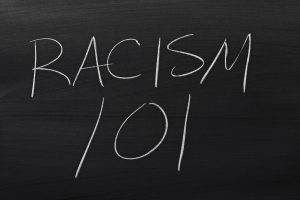Wanna Know What B**ches, Black Beans, And King Kong Have In Common?
Think our workplaces are enlightened places with equality for all? Think again.
 If you answered “nothing,” you would be … wrong.
If you answered “nothing,” you would be … wrong.
If you answered that these are slurs used in the American workplace like the oft-used “N-word” — you would be right!
Sadly enough.

Why Do AI And Legal Professionals Make The Perfect Partnership?

The N-word is, of course, the racist slur of choice. And nooses, KKK hoods, and references to lynching are also often employed to harass and intimidate workers of color.
For years, I have posted on my firm blog about every race and national origin harassment case which the EEOC, or individuals, have filed or settled because I think everyone should know the frequency in which this type of workplace harassment occurs.
So now I will subject you to a litany of such cases — prepared to be horrified.
Let’s start off slowly, with a recent news article which reported that a college intern with the Houston Mayor’s office was fired for posting an online rant of racial slurs and using the N-word in a recorded phone call.
Sponsored

Gain An Instant Understanding Of New Complaints With LexisNexis Snapshot

Diving Into Generative AI: A Practical Guide For Law Firms Starting From Scratch

Why Do AI And Legal Professionals Make The Perfect Partnership?


Gain An Instant Understanding Of New Complaints With LexisNexis Snapshot
Think this is an isolated incident? Think again.
Black Employee Called The N-Word and Black Bean
One recent EEOC lawsuit charged that a black employee was the subject co-workers’ frequent racial harassment at a New York location of a large chain of Tex-Mex restaurants.
It was alleged that one employee referred to him repeatedly as a “n—–r.” He was also called a “black bean” (this is a Tex-Mex place after all).
And, as in virtually all of these cases, it was alleged that management knew of all of this — and did nada.
Sponsored

Law Firms Now Have A Choice In Their Document Comparison Software

AI’s Impact On Law Firms Of Every Size

Pretty bad stuff.
But it gets worse — much, much worse.
“We Will Hang You. We Will Seriously Lynch You.”
One Washington State company sued by the EEOC agreed to pay $165,000 to settle a case in which it was alleged that the manager and assistant managers subjected the only black employee to slurs such as “spook,” “boy,” and “King Kong,” and told him that he had the “face of a janitor.”
And there were death threats. Death threats! In the workplace!
An assistant manager allegedly told him, “We will hang you. We will seriously lynch you if you call in again this week.” And another asked him if he was “ready to commit suicide,” and even offered him “assistance” if he wanted to do it.
Yes — he was fired.
Can’t get much worse than this, right?
Black Worker Has Hot Sauce Thrown On Her
Another employee was physically assaulted. Yep, that’s right.
A barbeque joint in North Carolina was sued by the EEOC for allegedly subjecting a black employee to repeated racist slurs by a white coworker “including use of the N-word and racial jokes about blacks. Some of the harassment occurred in management’s presence.”
She complained, the harassment continued, and she was forced to resign “after the co-worker threw hot barbeque sauce on her and called her the N-word.”
Threw hot sauce on her!
And this incident was witnessed by a manager!
Monkey, Mule, the N-Word, and More Lynching References
Yep, that one was pretty, pretty, pretty, pretty bad. But here’s another case to digest — or spit up.
The EEOC reported last month that it sued two Tennessee companies charging that for years they allowed managers and supervisors to subject black employees to daily harassment: they “regularly referred to African-American employees with profane, offensive and derogatory terms such as ‘n—-r,’ ‘monkey,’ ‘boy,’ ‘mule,’ etc.”
Yes, the N-word again. And more.
Moreover: “The company managers made demeaning racial references to the black employees’ skin color and hair texture, as well as negative ethnic and racial references to slavery, plantations, lynching and the employees’ African ancestry.”
Can You Stand Some More?
This stuff never ends. We got a million of ‘em.
A Pennsylvania truck-stop truck washing company was sued recently by the EEOC, which alleged that after it hired the only black employee at one facility, he was promptly subjected to being called the N-word by supervisors and other employees. The “Employee Rights” poster which was hanging in the break room was also defaced to read “N—–r Rights.”
Nice touch.
And, yet again, the slurs were allegedly made in front of the manager — who did nothing to stop them.
Oh, yes. The employee was, of course, fired after he complained.
See a common fact pattern? This kind of thing gets repeated endlessly in these cases.
The EEOC also charged that the foreman of a Missouri contracting company used the N-word repeatedly, and after a black employee complained the company transferred him to a less desirable job, and eventually fired him. In this case, the company settled for $25,000.
A Georgia company which makes auto parts was sued by the EEOC in September for allegedly allowing employees to call a supervisor the N-word, and permitting racist graffiti in the restroom.
Once again — sigh — when the victim complained he was fired.
“Your Husband Should Work In A Cotton Field With A Rope Around His Neck.”
I’ll subject you to only one more. Another horrific one.
In September, the EEOC sued an Ithaca manufacturer after the plant manager, besides allegedly using racial slurs, “told the only black employee that her husband should work in a cotton field with a rope around his neck.”
As a bonus, the manager also harassed women employees; among other things, he called women “bitches,” told one woman she could leave early if she would “come over here and sexually harass me,” and told another that she was too “fat and disgusting” to have sex with her.
Spook, Spade, and Buckwheat
Okay, I lied. One more.
In August, the EEOC sued an oil and gas company in North Dakota on behalf of a black employee whose co-workers called him “spook,” “spade,” and “Buckwheat.” And also the N-word. Who can forget that word.
Takeaway
These cases come from all parts of the country. Think our workplaces are enlightened places with equality for all?
Think again.
 Richard B. Cohen has litigated and arbitrated complex business and employment disputes for almost 40 years, and is a partner in the NYC office of the national “cloud” law firm FisherBroyles. He is the creator and author of his firm’s Employment Discrimination blog, and received an award from the American Bar Association for his blog posts. You can reach him at Richard.Cohen@fisherbroyles.com and follow him on Twitter at @richard09535496.
Richard B. Cohen has litigated and arbitrated complex business and employment disputes for almost 40 years, and is a partner in the NYC office of the national “cloud” law firm FisherBroyles. He is the creator and author of his firm’s Employment Discrimination blog, and received an award from the American Bar Association for his blog posts. You can reach him at Richard.Cohen@fisherbroyles.com and follow him on Twitter at @richard09535496.







